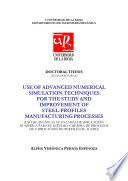Autores del Libro:
Resumen del Libro:

This work is the result of the European project TESTRA (Temperature and Straightness in Sections and Rail Straightening Processes , RFS-CR-03012). In this project the relation between the temperature and bending during the production processes of steel sections and their final residual stresses and bending was studied. The study was focused on structural beams I and H and grooved rail Ri60, used in urban transportation. The aim of the thesis was the modelling and simulation through Finite Elements (FE) analysis of two main sequential production processes, common to most of the manufacturing of long steel products: the cooling process and the straightening process. Thanks to the participation of manufacturing enterprises (PTG-Germany y VA-Austria) and research institutes (BFI-Germany) in the project, was possible to count on experimental data, very important to verify and calibrate the FE models. The residual stresses are those stresses that are locked in an object without the application of any external loads, Several theoretical and experimental studies have proved the negative influence of residual stresses on the duty properties of steel sections (decrease in the ultimate load of structural beams and crack propagation in rails, just to mentions some of them). The modelling and simulations of these processes through FE tools was considered important as the study of the residual stresses formation and its measurement are complicated to perform not only in laboratories but much more during normal production in real plants. Additionally to the FE study of the aforementioned processes, a methodology based on genetic algorithm is proposed to improve the straightening process. The methodology expects to be an automatic tool used to find the right rollers deflections in order to obtain a product with minimum residual stresses and with a bending value into an acceptable tolerance, i.e. with the best quality characteristics.
Formatos Disponibles: PDF / EPUB
Opciones de descarga:
Si deseas obtener una copia del libro puedes usar alguna de las siguientes opciones de descarga:
